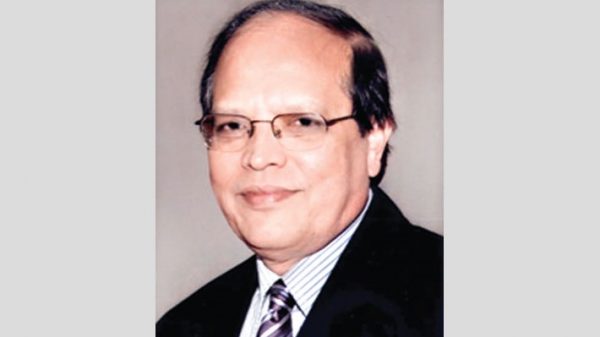Adoption of first Five-Year Plan

- Update Time : Tuesday, March 23, 2021
- 138 Time View

As indicated in the last piece of this column, Bangabandhu was an eternal optimist and could see far enough even while standing on the ashes of the war of liberation. His bold decision to present the nation with an inspiring and people-centric constitution just nine months after the liberation was indeed a splendid demonstration of his courage and determination for building the nation despite all challenges. Similarly, his announcement of forming the Planning Commission on his very first day of office as Prime Minister, with a promise to initiate the preparation of the first Five-Year Plan (FYP), was also a heroic move in those challenging days.
On that day when major top senior appointments for the high government offices were made, Bangabandhu also announced that Professor Nurul Islam would be the Deputy Chairman of the Planning Commission with himself as the Chairman. The three other members of the Commission included Professors Musharraf Hossain, Rehman Sobhan and Anisur Rahman, all economists who worked with Bangabandhu closely in formulating economic policies and pledges to be incorporated in the Constitution in line with the expectations of the Six-Point Programme during 1969-70.
The Planning Commission, a unique high powered think tank of the government, had a number of tasks to perform including “preparation and evaluation of Five-Year and Annual Plans; appraisal and approval of development projects; negotiation of foreign aid; formulation of policies, both macro and sectoral, in cooperation with other Ministries, including initiation of policy papers on major or new issues facing the economy; and evaluation of the performance of the economy, including that of the implementation of the Five-Year and Annual Plan” (Islam, Nurul, ‘Making of a Nation Bangladesh: An Economist’s Tale’, UPL, Second Impression, 2005, p. 137-139). The Planning Commission got to work without any delay and the First FYP was approved on 10th October 1973.
Moudud Ahmed wrote, “In the field of economic policy, the Awami League government took two steps of great significance and national importance. They were the preparation of the First Five Year Plan for 1973-1978 and the implementation of certain recommendations of the National Pay and Services Commission.” (Ahmed, Moudud, ‘Bangladesh-Era of Sheikh Mujibur Rahman’, UPL, 1983, p. 189). While explaining the objective of the newly established Planning Commission, Professor Nurul Islam wrote that the composition of the Commission was such that the members and Sheikh Mujib shared similar ideology and ideas (Islam, Nurul, op. cit. p. 139). In its ‘Foreword’ Bangabandhu aptly explained why he had to undertake this mid-term mission while the country was still in a fluid situation. He said “…it was decided to launch the Five Year Plan at an early date because the Government felt the urgent need to provide a sense of direction and determine the order of priorities within the framework of which coherent and consistent policies and programmes could be formulated.” He asked all people to “dedicate themselves to the task of nation building with single minded determination.” He was also confident that people would mobilise themselves to implement this plan with the same courage and vigour that they demonstrated during the war of liberation.
Professor Nurul Islam, the Deputy Chairman of the Commission, was equally forthright in his ‘Preface’ to the Plan about people’s participation in the context of the desired development which was, indeed, a slow and painful process. He too talked about the need for integrating reconstruction efforts with the long-term development perspective. In his words, “It means present sacrifice for future gains. It is especially painful for a country at a very low level of living such as Bangladesh, where an increasing reliance is to be placed on domestic resources for development. We can make the sacrifice, which is so essential for development, socially tolerable only if it is equitably shared by all.” (The Five Year Plan, May 1973, ‘Preface’).
The First FYP was divided into two parts. The first part elaborated the Framework of the Plan and the second focused on the Sectoral Programme. The Plan was in line with the four principles of the Constitution and was a step towards the socialist economy that Bangabandhu had dreamed of. However, his socialism was not borrowed from abroad. He wanted to give the nation socially equitable development opportunities for all with no scope for ‘unearned income’ (as pledged in Article 20 of the Constitution) and corruption in the broader sense. His commitment to uproot corruption from society was well-reflected in the Plan as well when it said, “… it is essential that people have confidence in the integrity and the commitment of the political leadership to translate words into deeds…It is specially relevant in the above context to ensure that people do not regard corruption as an endemic feature of our society. Corruption is basically an antisocial act…It is in this context that detection and punishment of offenders irrespective of their personal and political affiliations are necessary.” (ibid. p. 80). This was a bold and heroic commitment in the Plan that Bangabandhu pursued till his last breath. The historic speech he gave on 26th March 1975 immediately after launching his ‘Second Revolution’ concentrated a great deal on the issue of corruption. He said his farmers and workers were not corrupt. Rather, the corruption had concentrated in the smaller segment of the society which claimed to be educated including those in administration. These were tough words and meant to remind the people of the ultimate dream of his social transformation.
To understand Sheikh Mujib’s journey towards a socialist Bangladesh, it is also important to understand the contents of the First FYP. According to Professor Nurul Islam, “The socio-political objectives of the Five-Year Plan were derived from the Constitution of Bangladesh. The plan was considered a first step towards the progressive achievement of a socialist economy in the future – an objective embodied in the Constitution and the various policy statements of the Awami League, including its election manifesto in 1970. The Plan thus reflected the Planning Commission’s understanding of the directives of political leadership.” (Islam, Nurul, op. cit. p. 191). The first chapter of the Plan was titled ‘Social and Political Perspectives of Planned Development’. The chapter started with the four state principles and elaborated on its commitment to the Constitution. The First FYP provided a framework that would help achieve the Constitutional provisions which aimed to eliminate exploitation.
In order to achieve such a society, the FYP set some preconditions. These preconditions were the removal of the capitalist system of the income distribution, private ownership of means of production, and feudal forms of production relations. In addition, changes in land ownership and socialisation of agriculture were necessary preconditions. The Plan also argued that disruption in production due to unrest among labourers would be too harmful to the economy of Bangladesh and to avoid this, the government had to convince the people that they would ensure minimum wage living for the labour force. The income policy would be the same for both private and public sector workers and the removal of unproductive consumption was also encouraged. According to the FYP, “For a well-formulated socialist plan, the basic premise has to be that the Government and the ruling party will have the will and the determination to transform a society with traditional values to a production-oriented society where work, discipline and savings are the basic tenets of economic activity.” (The First Five Year Plan, 1973, p. 1-3).
Drastic ideological, social and economic changes were required among the people in order to realise what the FYP had set out to achieve. In the context of Bangladesh then, the plan proposed a framework that would have helped achieve a society where no capitalist would have the power to exploit the poor and become rich at the expense of others. These were, no doubt, highly ambitious goals but were derived from the political commitments made by the leadership during the entire Pakistan period and in sync with the exploration of expectations of the people during the war of liberation where almost all people participated with vigour and enthusiasm. The Planning Commission was certainly aware of the limitations of the implementation machinery for realising these lofty goals and tried to be as pragmatic and flexible as possible.
It is in this context that the Plan discussed the need for cadres who were ideologically driven and would help integrate people into the journey towards realising the goals of indigenous socialism as desired by Bangabandhu. These cadres were expected to organise people to participate in the development activities of the local government as well as help them get the desired government services from various offices of the government. Their rewards would be the realisation of their ideals, the Plan said. These cadres would need to be monitored in order to avoid deviation (ibid. p. 3-4). The roles of the cadres included facilitating development work, educating and motivating people, identifying projects, persuading people to contribute land and materials when necessary and preventing misappropriation of resources. As already indicated, the Plan also focused on the need for eliminating corruption as it would be impossible to achieve a socialist transformation of such scale with corrupt individuals (ibid. p. 7-8).
The objective conditions of the country were also analysed in the FYP. It identified both factors for and against the facilitation of a socialist transformation. The factors that worked against the transformation were the structure of the administration, dominance of private enterprise and the presence of intermediaries that worked between the government and the people. On the other hand, heightened political consciousness, the expectation of a socialist economy to ensure social justice, socialist ideologies of most political parties, more equal land ownership than other developing countries, awareness among the rural people, skilled people joining the government services and a generation of young men and women dedicated to the cause of socialist transformation contributed as factors in favour of the transformation into a socialist economy (ibid. p. 4-5).
The Socio-political assumptions of the Plan included Investment Strategy, Reduction of Exploitation, Importance of Material Rewards and Public Participation. The Investment Strategy proposed by the FYP aimed to meet consumption needs and increase employment as well as reduce dependence on external help. In order to reduce exploitation, the Plan suggested land reforms, nationalisation of big industries and promotion of small and cottage industries, nationalisation of trade, housing and transportation. It also mentioned that at first high material rewards may be required to encourage skilled people to take on jobs. Emphasis was also given on public participation in planning and they suggested deeper consultations among the different interest groups and the Planning Commission (ibid. p. 6-7) to understand better the objectives and goals of the Plan.
Many observers including politicians, also party to the formulation of this Plan, were critical of the document without understanding the very nature of this exercise. The planning process in a country like food deficient Bangladesh, which was primarily based on an agricultural economy with a plethora of climate shocks and was braving enormous volatilities in foreign exchange earnings and uncertain flow of foreign assistance, was prone to changes in the resource envelope with significant impact on intersectoral priorities. Hence, it was better to treat the FYP only as an “examination of the economy’s potential, a statement of its objectives and priorities as well as a set of recommendations for policy and institutional reforms.” (Islam, Nurul, op. cit. p. 201). Bangabandhu was aware of these limitations of planning with our scarce resources and weak institutional framework as reflected in his ‘Preface’ to the Plan. And hence, he was prudent enough to say, “No plan, however well-formulated, can be implemented unless there is a total commitment on the part of the people of the country to work hard and make necessary sacrifices.” What a pragmatic and farsighted statesman!
The author is Bangabandhu Chair Professor, Dhaka University and former Governor, Bangladesh Bank. He can be reached at dratiur@gmail.com



















